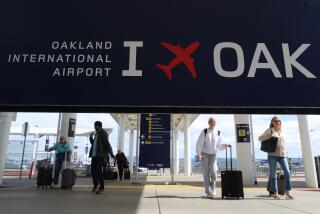Airport Officials, in Wake of Veto, Fret About Future
- Share via
Gov. George Deukmejian’s veto of a measure that would have shielded airports from many noise-nuisance lawsuits has been praised by anti-noise homeowners groups, but the head of the Burbank Airport authority criticized the veto as a threat to the airport’s existence.
“This will force the airports to either mitigate noise or litigate damages,” said Richard Close, president of the Sherman Oaks Homeowners Assn. and spokesman for five other groups from Van Nuys, Burbank, North Hollywood, Studio City and Sun Valley.
Deukmejian last week vetoed a bill backed by most of the state’s publicly owned airports that would have protected them from repeated lawsuits by the same neighbors over aircraft noise.
Robert W. Garcin, president of the Burbank-Glendale-Pasadena Airport Authority, said the decision means that the airport will have to fight “a multiplicity of lawsuits, by the same plaintiffs, over and over again.”
Closing Is ‘a Possibility’
“It could lead to the closing of the airport--that would take several years, but it’s a possibility.”
He suggested jokingly that “the state of California consider moving all welfare recipients to live in areas adjoining airports so they can receive a steady supply of welfare checks directly from the airports and save the state the trouble.”
Garcin said the governor has “granted a windfall to a segment of the population in houses neighboring an airport,” because their inhabitants will be entitled to file an unlimited number of lawsuits.
“I think brokers will advise people living near airports that their property is worth more now because they could receive this steady stream of money,” he said.
Scoffed at Warning
Close scoffed at Garcin’s warning that the financial burden of repeated lawsuits could force the airport to close.
“If he’s so concerned about that, why doesn’t he limit the flights from the airport and reduce their legal exposure?” Close asked. “If you’re concerned about reducing the number of flights, you don’t double the size of your passenger terminal.”
Garcin and other airport administrators have argued repeatedly that, under federal court rulings and Federal Aviation Administration procedures, they must admit any airline to the airport if its planes meet federal noise standards.
The airport authority recently announced plans to build a larger terminal to comply with an order by the FAA, which ruled that the existing 55-year-old terminal is too close to the runways to meet modern safety requirements.
No Objection
“We don’t object to a new terminal as long as it is the same size and capacity as the original, not bigger,” Close said.
Don Schultz, president of Ban Airport Noise, which represents residents annoyed by noise from Burbank and Van Nuys airports, said he was pleased by the governor’s veto.
He called talk of closing Burbank Airport “an unrealistic scare tactic to generate fear in enough individuals who are sympathetic to the airport and unsympathetic to the noise problems it creates.”
“Before the airport even thinks about closing down, they’ll come to the bargaining table” and work out a settlement with people who have filed noise suits, he predicted.
Close said the major effect of the governor’s action “will be to make it difficult for the airport to sell bonds to build a new terminal. Preventing construction of a new terminal or limiting the terminal to the size of the present building “will put a cap on the increase in the number of flights,” he said.
Third Veto in Four Years
The governor vetoed--for the third time in four years--a bill that would have nullified a landmark decision by the California Supreme Court in a suit against Burbank Airport. The California court, upheld by the U. S. Supreme Court, ruled that airport noise is a “continuing nuisance.”
The ruling allows the same plaintiff to file lawsuits repeatedly, as long as the nuisance continues. The airports had wanted to be classified as “permanent” nuisances, which would allow neighbors to bring suit only once for the same complaint.
Airport operators argue that the potential of an unlimited number of court judgments against them is damaging in two ways.
They say it raises questions about the airport’s financial health, making it harder to borrow money for improvements. It also forces operators to increase fees paid by airlines in order to fight lawsuits and raise money to meet judgments. That, administrators say, may drive away the airlines, the airports’ source of income.
Garcin said he does not know how many noise lawsuits are pending against Burbank Airport.
“When they try to tell me,” he said, “I hold my ears and just say, ‘Oh, my God.’ ”
Airport spokesman Victor Gill said 333 plaintiffs representing residents of 168 properties have noise actions pending against the airport. Another 48 claims have been filed against the airport, a preliminary stage to a lawsuit, he said.
More to Read
Sign up for Essential California
The most important California stories and recommendations in your inbox every morning.
You may occasionally receive promotional content from the Los Angeles Times.










